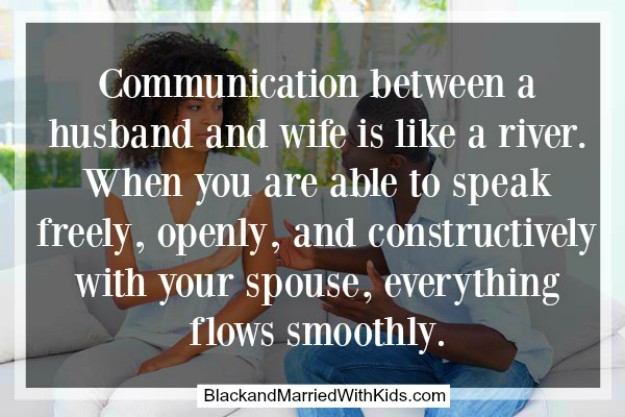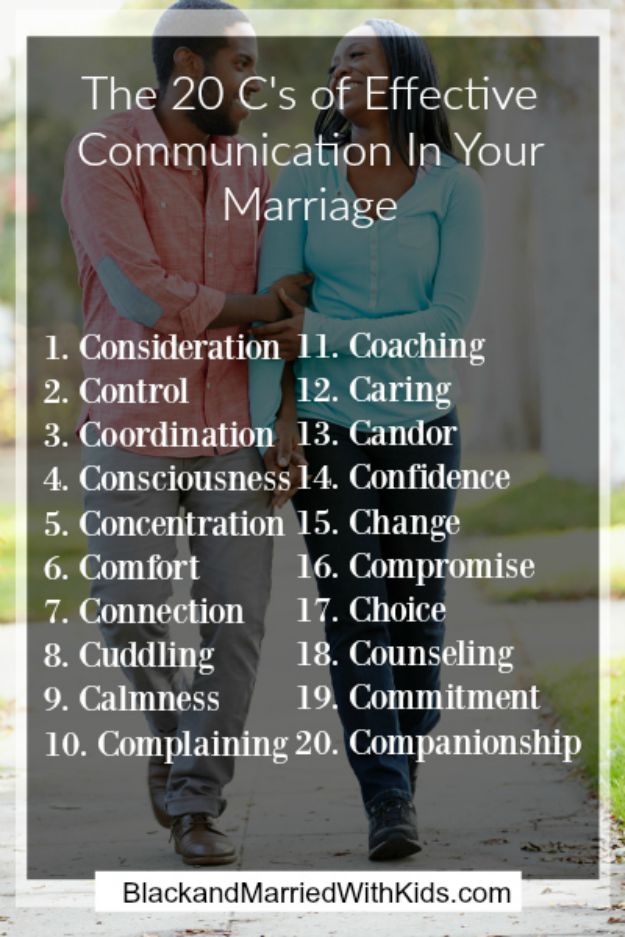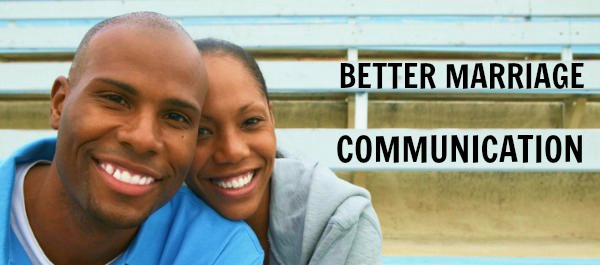Bad communication can trap you inside an unhappy marriage. Find out what you can do to improve communication in your marriage here!
In this article:
- Top Unhappy Marriage Signs
- Our Communication Story
- Real Talk
- The A’s and B’s of the Four C’s
- The 20 C’s of Effective Communication in Your Marriage
- How to Get Started Improving Communication in Your Marriage
- How We Turned It Around in Our Marriage
Overcoming an Unhappy Marriage with Better Communication
- Part 1 [You Are Here] – How We Went From Fussing and Fighting to Being Happily Married for 10 Years
- Part 2 – 5 Things That We Did to Improve Our Communication and Save Our Marriage
- Part 3 – Alert: Good Communication Will Not Solve All of Your Marital Problems, But These Will
Top Unhappy Marriage Signs

We’ve all been there:
Husband: “Honey, you look beautiful today?”
Wife: “What do you mean, ‘today?’”
Or
Wife: “Babe, you’re the best!”
Husband: “Best out of whom?”
And so it begins. Poor communication can literally ruin a relationship. It’s one of the unhappy marriage signs you should be wary of. As a wife and mother in a once struggling, blended family, I know.
So, how did we grow from an unspeakably troubled union into the nationally featured and leading voice of African-American relationships and parenting?
First, consider the following analogy:
Communication between a husband and wife is like a river. When you are able to speak freely, openly, and constructively with your spouse, everything flows smoothly.
However, like a river cluttered with debris, our relationships suffer when we avoid the important issues…
- Financial concerns
- Discipline objectives
- Intimacy needs
…and focus only on the routine matters of life:
- Dentist appointments
- Grocery shopping
- Our kid’s activities
Eventually, with enough pressure, our suppressed emotions, ideas, and thoughts come crashing through that wall. And, like a suddenly broken dam, all hell…
- Name calling
- Door Slamming
- Filthy Language
- No language
…breaks loose.
Words are flowing again…but it’s not exactly the same peaceful flowing river we previously experienced.
It is like the uncontrollable, white water rapids.
And those rapids can cause damage that will affect your intimacy and closeness with each other.
That’s why it’s important to nip communication issues in the bud before they become raging rapids.
In this article, I’m going to reveal to you the communication-based tips and techniques we used and continue to use in our marriage to be able to have effective communication which resulted in an increased level of intimacy and closeness that we could have never imagined before we got married.
Our Communication Story

In the early days of our marriage, our communication sucked!
I was a single mother of two who was raised in a two parent home by a couple who has been married for more than forty years.
Lamar was a single man who was raised by his mom.
We entered our marriage with vastly different expectations and clearly distinct styles of communicating.
It wasn’t long before we were having problems effectively expressing our expectations and resolving differences in a healthy way.
And since every attempt at substantive communication was ineffectual, we began to avoid the tough conversations altogether.
We quickly learned: Avoiding the straight talk – those tough conversations – only delayed the inevitable.
When disciplinary issues arose, the fights came with them. When differences in opinion came down, we threw our hands up.
Our communication was barely existent. Our intimacy was in turmoil. Our marriage began to crumble.
We had to find a solution. Fast.
Real Talk
May I be honest with you?
Most of the couples that we talk to say they are having communication problems in their marriages.
In our line of work, we are privileged to speak, either live or via the web, with hundreds (if not thousands) of couples each year. A recent webinar poll revealed this shocking reality:
OVER 72% OF PARTICIPANTS WERE HAVING COMMUNICATION PROBLEMS.

And you know what else they said?
We’ve read books and we are trying to do everything right…but my spouse and I are still having problems communicating.
You know what I told them…
You’re not doing enough.
I know that sounds harsh, but it’s the truth.
How to Learn Better Communication
Get our expert-led video training on better communication from the comfort of your own home.
Click here to learn about our BMWK Effective Communication Course!
The A’s and B’s of the Four C’s
If you’re reading this, and great communication is an issue for you and your spouse, then by now you may have heard of the Four C’s of Effective Communication:
- Comprehensiveness – can your message be understood?
- Credibility – is your message credible and can it be backed up by data?
- Connectivity – can your intended audience connect with your message…does it invoke emotion?
- Contagiousness – is your message contagious… and will it stick with your intended audience?
Utilizing this technique may set you on the right path. But it may not get you to your desired destination.
What is that desired destination?
It’s being able to talk to your spouse about anything and everything at any time. Am I right?
You want to have regular conversations with your spouse.
You want to share what’s on your mind: your deepest secrets, your most pressing concerns, and your most embarrassing moments.
You want to argue or disagree with your spouse without it becoming an all-out brawl that leaves you feeling hurt or, even worse, wanting to leave your marriage.
You want to laugh, cry, and be vulnerable with your spouse and feel close enough to sincerely share tender moments.
You want to know that your spouse knows your heart. So that even when you don’t have the right words to say, your spouse knows exactly how you feel at that moment.
At the most basic level, you want to know that your spouse gets you.
The 20 C’s of Effective Communication in Your Marriage

While talking is important for effective communication, researchers estimate that when a person is discussing what they like or dislike, approximately 60% of that communication is non-verbal.
While what you say is important, so is how you say it, when you say it, and the attitude with which you say it.
And this is how we know that there are so many more components that factor into effective communication in a marriage. In fact, we say there are 20 C’s of Effective Communication in Marriage:
- Consideration – you must be considerate of your spouse’s feelings when talking to them.
- Control – you should exercise self-control when you are communicating with your spouse. Going “ham” and saying things that you will regret later is not acceptable.
- Coordination – when trying to have the tough conversations, it’s important to coordinate with your spouse. When you choose to bring up topics is just as important as how you choose to tell them.
- Consciousness – it’s important to be conscious of your verbal and non-verbal cues when communicating with your spouse. Are you saying one thing, but your actions are saying something different?
- Concentration – when your spouse is speaking, you should intentionally concentrate on what is being said in an effort to understand rather than on what you are going to say next.
- Comfort – you and your spouse should create a safe space to express yourselves without fear of retribution and feel comfortable enough to tell each other anything (good or bad).
- Connection – It’s hard to communicate with a person that you are not emotionally connected with. Ensuring emotional connection is important.
- Cuddling – physically touching (holding hands, sitting close, touching knees) when you are having conversations with your spouse (especially the tough ones) helps to keep the situation under control.
- Calmness – when things get heated, remember to call a time-out until you are able to calm down.
- Complaining – yes, that is right…complain. We are not asking you to avoid the tough conversations (as that would build resentment). We are, however, asking you to be mindful in how you address your issues.
- Coaching – talking comes naturally for most people, but being able to effectively communicate with your spouse will take extra effort. You will need to practice your communication skills over and over again until they improve.
- Caring – you can be the best communicator in the world, but it will mean nothing if you are selfish and if you are manipulative.
- Candor – being open, honest, and sincere is the only way to go. A lack of trust can severely hamper communication.
- Confidence – believe it or not, a large part of your communication success has to do with mindset. Are you confident that things will improve and get better? Or, are you certain that things will stay the same or get worse? Your thoughts have the ability to influence your actions. If you expect a disagreement, there will probably be one.
- Change – you come into marriage with certain expectations and so does your spouse. Therefore, you will need to be flexible and open to adjusting those expectations.
- Compromise – when things get tough, are you able to cut a deal? Can you work together to find a solution that works for the both of you?
- Choice – you can choose to always address your spouse in a loving way, even during those times when you are not feeling so loving.
- Counseling – sometimes you need a qualified 3rd party to help you through the challenges you can’t resolve on your own – therapist, coach, mentor, pastor, or trusted friend or family member.
- Commitment – you can’t improve the communication in your marriage on your own. You both have to be committed to the process of understanding each other and working on a communication process that works best for your relationship.
- Companionship – this goes hand-in-hand with commitment. One of the joys of being married is the partnership. Your spouse needs to know that you’re on their team, you have their back, and they can come to you with anything.
Wow, that seems like a lot…no wonder people are having communication problems in their marriages.
But, I believe that most people are already doing, or have the capacity to do, more than 80% of the items on the list.
Just think about how you apply the 20 C’s of effective communication in your jobs.

In our everyday lives, we are able to communicate effectively with people or co-workers. And sometimes we don’t even like those people.
But we do it.
We schedule time to talk about issues (meetings)…
We compromise…
We’re flexible and we make changes…
We remain calm…
We work on solutions…
We’re attentive and we take notes…
We refrain from name calling…
We refrain from neck and eye-rolling (or at least we try to)…
We remain committed even if we hate what we’re being asked to do…
We get up every day, we go to work and try again…
And we do all of this because the alternative to losing our jobs is not desirable to us.
But isn’t the alternative of losing your marriage much worse than losing a job?
How to Get Started Improving Communication in Your Marriage
Most people are not born with an innate ability to effectively communicate with anyone, much less in a marriage.
If you want to have healthy, open and honest communication in your marriage, you will have to work on it.
But, where should you start?
- First, have honest discussions about the state of communication in your marriage – what works, and what’s not working.
- Begin to put in the work to identify what needs to be done to ensure each person feels clearly understood.
This doesn’t happen overnight; you will need to be intentional about obtaining the right skills and setting the time aside to work on your unhappy marriage.
This is why we’ve created the BMWK Effective Communication (Online Training) – a five-part training led by BMWK communication expert Emma J. Wallace, M.Ed., LAPC, NCC (includes exercises and worksheets) that will show you how to quickly start changing the communication in your marriage so you can make things better.
How We Turned It Around in Our Marriage
Today, I can tell my spouse anything and I feel confident that we will eventually come to a place of resolution.
I say eventually because we don’t always agree. But I can confidently say that we are always looking for ways to accommodate each other.
I no longer worry about being right…what matters is whether my spouse is OK.
Getting to this point took a lot of work on both of our parts.
Like us, you don’t have to be trapped in an unhappy marriage. By implementing the tools and tips shared by our BMWK Effective Communication (Online Training), you too can learn how to get out of an unhappy marriage and right into a happy one!
And the best part of this is you can receive this training from the comfort and privacy of your own home.
Sign up now for the BMWK Effective Communication (Online Training) and begin transforming the communication in your marriage.
How to Learn Better Communication
Get our expert-led video training on better communication from the comfort of your own home.
Click here to learn about our BMWK Effective Communication Course!
BMWK – Are you in an unhappy marriage because of communication? Do you want to overcome this with your spouse? Sound off in the comments section below.
Up Next: 3 Easy & Effective Tips To Reduce Conflict In Your Marriage
Editor’s Note – This post was originally published on Oct 26, 2015, and has been updated for quality and relevancy.


Leave a Reply